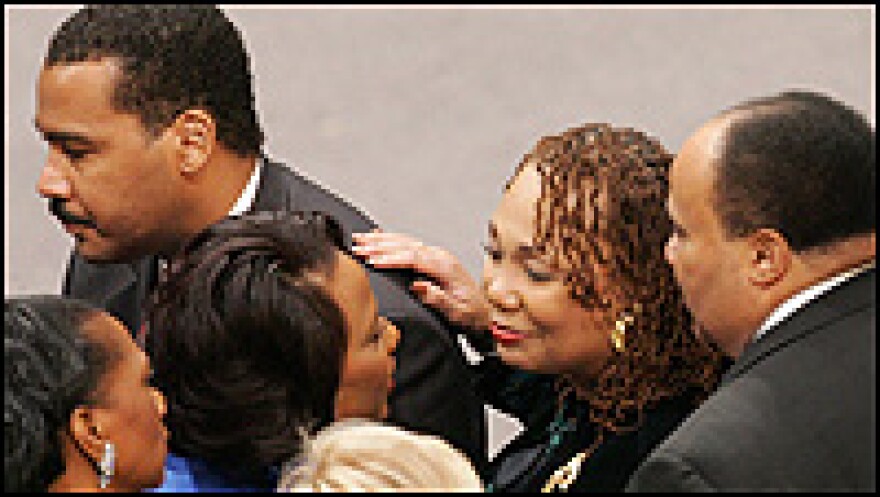
I was a high-school junior when Martin Luther King was assassinated. I remember listening to the news, in disbelief, in the twilight hours of April 4, 1968. A few days later, we were glued to the television as we watched his funeral.
Numerous dignitaries from around the world crowded into the dark wood pews at Atlanta's Ebenezer Baptist Church. I remember being particularly focused on one of them: Robert Kennedy was somber, even tearful at times, as he knelt and crossed himself and prayed with his wife, Ethel, before the service began. He would be killed a scant three months later by an assassin's bullet.
The other indelible image is of Mrs. King and her children. Like Jackie Kennedy before her, Coretta Scott King sat still and composed as all around her wept. She stroked her youngest child, Bernice, as the preschooler raised sad eyes to her mother and looked around in wonder at all the strangers in the church that had been home to three generations of Kings. (That moment would be captured for posterity by Moneta Sleet Jr., who photographed the funeral for Ebony and Jet; he would later be awarded a Pulitzer Prize for the mother-daughter portrait of grief.) The next-youngest, Dexter, leaned silently against his mother's side.
Yolanda and Martin III sat nearby, numb with sadness. She was closest to my age, so while the adults worried aloud about what King's assassination would mean for the future of the civil rights movement, I wondered about the future of Yolanda and her siblings.
I got my answer less than a decade later when, one ridiculously snowy evening in Washington, D.C., my doorbell rang. A young cousin who lived in Atlanta and had worked on the Carter campaign had stopped by during inauguration week. He had come up for the festivities, and he had two friends with him.
"Hey, hope you don't mind, but I brought Yoki and Marty with me," he apologized as the three swept up the stairs of my DuPont Circle townhouse.
There, in my living room, shaking off snow and laughing, were the kids in the picture — two of them, anyway. And I was happy to see that they bore no resemblance to the sad-eyed youngsters I'd seen on television during their father's services.
"I'm Yoki," Yolanda King said, smiling. "Thanks for having us."
I remember thinking she was sparkly — a good, throaty laugh, good sense of humor, the ability to dramatically capture the room's attention. (After all, she was a theater major.) We compared notes about having gone to women's colleges and teased each other about the perceived weaknesses of our respective alma maters.
Marty was quieter, but he tossed in a quip or two when he could manage to get a word in edgewise. We had cups of tea because it was so frigid that night, and then they were gone.
I thought of that evening often over the years, the unexpected appearance of the living children of a beloved icon. I watched as the four King children grew into adulthood, then middle age, all single. Historian David Garrow, who won a Pulitzer for his biography of King and who remains friends with many King intimates, says it's not so surprising that none of the King children married. "While Mrs. King was alive, the standards to which she would hold any potential life partner of any of her children would be so high as to be almost unmeetable," he speculates.
Garrow says his first inclination when he heard of Yolanda's death was: This is it.
None of them have children, and there will be no third generation of Kings to carry on Martin Luther King's legacy.
No blood children, maybe, but as Yolanda pointed out in an NPR interview a few years ago, when people feel empowered, they become part of the King legacy:
"I think it takes that for people to be effective change agents and to be champions of peace in their own lives. And that's how we can effectively commemorate the life of Dr. Martin Luther King Jr."
And that's how we can now commemorate his daughter.
Copyright 2023 NPR. To see more, visit https://www.npr.org. 9(MDM3NjYwMjA5MDE1MjA1MzQ1NDk1N2ZmZQ004))


